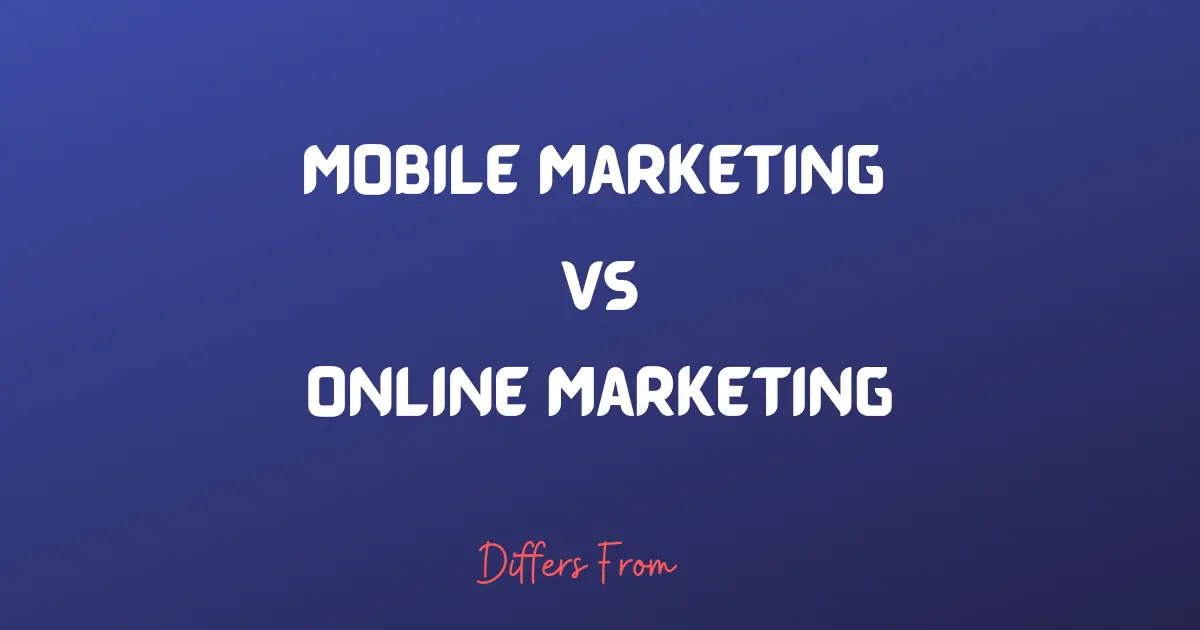Mobile marketing focuses on reaching and engaging audiences through mobile devices, such as smartphones and tablets, using techniques like SMS marketing and in-app advertising.
Online marketing encompasses a broader range of strategies that target audiences across various online platforms, including websites, social media, search engines, and email marketing.
Let’s go!
Difference between mobile marketing and online marketing
| Mobile Marketing | Online Marketing | |
| Platform Focus | Specifically targets users on mobile devices, such as smartphones and tablets. | Encompasses a broader scope, including desktops and laptops in addition to mobile devices. |
| Accessibility | Emphasizes on reaching users on-the-go, leveraging the portability and convenience of mobile devices. | Targets users across various online channels, including websites, social media, and search engines. |
| User Experience | Prioritizes mobile-friendly design and content tailored for smaller screens and touch interactions. | Involves creating content for a range of devices, considering both desktop and mobile user experiences. |
| Channels Utilized | Utilizes channels like SMS, in-app advertisements, mobile apps, and mobile-optimized websites. | Encompasses a broader range of channels, such as social media, email marketing, content marketing, and search engine optimization. |
| Location Targeting | Takes advantage of GPS and location-based services for targeted advertising based on the user’s physical location. | Generally relies less on precise location data and more on user behavior and preferences. |
| Personalization | Often requires more personalized and context-aware content due to the intimate nature of mobile device usage. | Personalization is important but may not be as immediate or location-specific as in mobile marketing. |
| Advertising Formats | Utilizes formats like mobile banners, interstitial ads, and video ads optimized for mobile screens. | Includes a wider variety of ad formats, such as display ads, video ads, sponsored content, and native advertising. |
| App Involvement | Actively engages with users through mobile apps, utilizing app-based notifications and advertisements. | Involves web-based interactions and may not directly engage with users through dedicated apps. |
| Speed and Connectivity | Considers variations in network speeds and connectivity, optimizing content for faster loading on mobile networks. | Assumes a more stable and higher-speed internet connection, allowing for richer multimedia content. |
| Device Limitations | Adapts to the limitations of mobile devices, considering factors like smaller screens, limited storage, and different operating systems. | Designed for a broader range of devices, including larger screens and varied operating systems, with fewer inherent limitations. |
What is mobile marketing?
Mobile marketing refers to the practice of promoting products or services to target audiences through mobile devices, such as smartphones and tablets.
It involves strategies like SMS marketing, in-app advertising, mobile apps, mobile-optimized websites, and location-based marketing.
Mobile marketing leverages the ubiquity and personal nature of mobile devices to reach and engage audiences, delivering targeted messages, offers, and experiences that are tailored to the preferences and behaviors of mobile users.
What is online marketing?
Online marketing encompasses a wide range of strategies and techniques aimed at promoting products or services through various online platforms.
This includes channels like websites, search engines, social media, email marketing, content marketing, display advertising, and more.
Online marketing leverages the power of the internet to reach and engage target audiences, driving traffic, generating leads, and ultimately increasing brand awareness, customer acquisition, and sales.
Comparison between mobile marketing and online marketing
While mobile marketing focuses on reaching and engaging audiences specifically on mobile devices, online marketing encompasses a broader range of channels and strategies to reach audiences across various online platforms.
Mobile marketing often emphasizes location-based targeting, in-app advertising, and SMS marketing, while online marketing encompasses SEO, social media marketing, content marketing, and email marketing as key components.
Reach and Accessibility
Mobile Marketing: Targets users specifically on mobile devices like smartphones and tablets, allowing businesses to reach a large and engaged mobile audience.
Online Marketing: Reaches audiences across various online platforms, including websites, search engines, social media, and more, providing a wider reach but not limited to mobile devices.
Targeting and Personalization
Mobile Marketing: Utilizes location data and user behavior to deliver targeted and personalized advertisements and promotions, leveraging the personal nature of mobile devices.
Online Marketing: Utilizes data analytics, user demographics, and behavior to deliver targeted content and advertising across different online platforms, tailoring messages to specific audiences.
Communication Channels
Mobile Marketing: Uses channels like SMS marketing and in-app advertising to directly communicate with users on their mobile devices, providing a more immediate and personal connection.
Online Marketing: Uses various communication channels such as websites, search engines, social media, email marketing, and content marketing to engage with audiences, offering more diverse ways to interact.
User Experience
Mobile Marketing: Focuses on delivering seamless user experiences within mobile apps and mobile-optimized websites, leveraging the unique features and functionalities of mobile devices.
Online Marketing: Aims to provide a consistent user experience across different online platforms, optimizing websites and content for desktop and mobile users alike.
Engagement and Interactivity
Mobile Marketing: Utilizes interactive features like push notifications, in-app surveys, and gamification to engage users and encourage active participation.
Online Marketing: Engages audiences through interactive content, social media interactions, comments, reviews, and other forms of user-generated content.
Conversion and Sales
Mobile Marketing: Offers opportunities for instant conversion and purchases through mobile-optimized checkout processes and mobile payment options.
Online Marketing: Provides multiple touch points and strategies to drive conversions, including lead generation forms, e-commerce platforms, remarketing campaigns, and email marketing.
Conclusion
In conclusion, mobile marketing focuses on targeting users specifically on mobile devices, utilizing channels like SMS marketing and in-app advertising.
Online marketing, on the other hand, encompasses a broader range of strategies across various online platforms, including mobile devices.
Both forms of marketing offer unique advantages and play important roles in reaching and engaging audiences in the digital realm.
FAQs
What is the main difference between mobile marketing and online marketing?
Mobile marketing specifically targets users on mobile devices like smartphones and tablets, while online marketing encompasses a broader range of strategies that target audiences across various online platforms, including mobile devices.
Can online marketing be considered a subset of mobile marketing?
No, it is the other way around. Mobile marketing is a subset of online marketing, focusing specifically on reaching and engaging users on mobile devices.
How do mobile marketing and online marketing differ in terms of reach?
Mobile marketing targets a specific audience using mobile devices, while online marketing has a wider reach, targeting users across various online platforms, including mobile devices.
What are some key channels used in mobile marketing?
Mobile marketing channels include SMS marketing, in-app advertising, mobile apps, mobile-optimized websites, and location-based marketing.
How does personalization differ between mobile marketing and online marketing?
Mobile marketing leverages features like location data and in-app behavior to deliver personalized content and ads, while online marketing uses data analytics and user demographics to deliver personalized experiences across multiple online channels.
Which type of marketing offers more immediate and direct communication with users?
Mobile marketing offers more immediate and direct communication through channels like SMS marketing and push notifications on mobile devices, providing a direct and personal connection with users.

